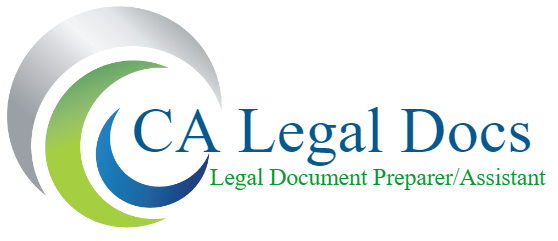Probate Accounting
Probate accounting is also known as trust accounting. It is simply an accounting of the transactions undertaken by an estate during a specific reporting period. Section 16062 of the California Probate Code requires trustees to provide an accounting at least once a year.
California has some very specific guidelines regarding probate accounting. Are you acquainted with all of the responsibilities of an estate trustee in the state? If not, CA Legal Docs is here to help navigate you through the process.
As the estate’s trustee, a number of duties and responsibilities fall squarely on your shoulders. That means that it’s in your best interest to stay in compliance with all legal requirements imposed on you. In particular, California Probate Code places a legal duty on trustees to provide an accounting to trust beneficiaries.
Probate Accounting in California
Probate accounting also known as trust accounting. It is simply an accounting of the transactions undertaken by an estate during a specific reporting period. Section 16062 of the California Probate Code requires trustees to provide an accounting at least once a year.
An accounting is also required when the trust is terminated. Such as when the trustee wishes to close the estate. Bringing a petition for final distribution of the estate’s assets to its beneficiaries, as well as whenever there’s been a change in trustee.
California Probate Accounting Format
While a probate accounting in California does not require the preparation of any specific forms or the use of any particular format, there are a number of pieces of information you need to include in your accounts. Section 16063 of the Probate Code requires accountings to contain the following information:
- a statement of receipts and disbursements of trust principal and income occurring either during the last complete fiscal year of the trust or since the last accounting was made
- a statement of assets and liabilities of the trust at the end of the trust’s last complete fiscal year or at the end of the reporting period covered by the account
- information regarding the trustee’s compensation
- information about any agents hired by the trustee
- a statement that beneficiaries may petition the court to obtain a review of the account and the acts of the trustee
- a statement that all claims for breach of trust are subject to a three-year limitation period
Waiver of Probate Accounting
There are, however, exceptions to the rule that an accounting is required. The need to submit a probate accounting can be waived if either of the following conditions are met:
- All persons entitled to a distribution from the estate have executed and filed a written waiver of account or a written acknowledgment that their interest in the estate has been satisfied.
- The interest of every person entitled to distribution from the estate has been satisfied in full.
Final Accounting Objections in California Probate Court
Beneficiaries have up to three years to file an objection or a challenge to a trustee’s accounting. If an objection is filed, you as the trustee need to prove that the information you’ve provided in your accounting is accurate. As you might imagine, this can be a burdensome undertaking.
In many probate cases, beneficiaries don’t file an objection, but disputes over final accounting can and do happen. Because the limitation period provides beneficiaries with three years to file an objection, one approach a trustee can take to obtain certainty about the finality of their accounting is to file a petition for court approval of the accounting under Probate Code Section 1064.
Once the court’s approval is obtained, a beneficiary is no longer able to file an objection to the accounting. Nor can they make a claim challenging the trustee’s actions. In other words, when a court grants a petition for approval of the final accounting, the trustee no longer faces potential liability. Either for mistakes made in the accounting or for their own actions as trustee of the estate. This is why, although filing such a petition requires extra work on the trustee’s part, it is a step many trustees choose to take.
While probate accounting in California does require a certain amount of work and due diligence on the part of an estate trustee, submitting an accounting is something every trustee is required to do at least annually, and most certainly upon final distribution of the estate, unless proper waivers of the accounting can be obtained. If you need help with your probate accounting, consider CA Legal Docs to facilitate the process. As an instructor who teaches a Court Accounting class for the Contra Costa County Superior Court, we have the experience you need.
The conservatorship is the fiduciary role of handling finances. Part of the financial responsibility that comes with being a conservator is the responsibility to account.
Conservatorship Accounting
A conservatorship accounting, which is a form of fiduciary accounting, is a comprehensive report of the activity within a conservatorship during a specific period. To assure that the conservator is properly carrying out their duties of managing the conservatee’s finances, the Court requires that a conservator submit a periodic accounting for its review and approval.
An appointed individual must submit an accounting when they hold the authority to conserve, manage, and use the conservatee’s property for the benefit of the conservatee. Thus, accountings are required when the Court appoints a conservatorship of the estate. By contrast, accountings are not required if the Court appoints only a conservatorship of the person. This is because while an individual appointed only a conservator of the person may assist a conservatee with their personal affairs, they have no authority to manage the conservatee’s finances.
A fiduciary is an individual or institution entrusted with carrying out the terms of a trust, conservatorship, guardianship or estate in a legal and ethical manner. A fiduciary serves either by court appointment or by agreement with a private party. Common titles for fiduciaries include Trustee, Conservator, Guardian, Executor and Administrator.
Fiduciaries are required to provide periodic accountings to their clients and, if they are court-appointed, the accountings must be filed with the court for approval as well. Their accounting should conform to the California Probate Code and detail all of the receipts, disbursements, distributions, sales, gains and losses that occurred within the accounting period.
What is a fiduciary?
Do not let the mundane-sounding name fool you – fiduciary accounting is anything but fun! A properly prepared accounting offers valuable insight into the inner workings of a trust, conservatorship, guardianship or estate administration. The information is presented in such a manner that most everyone, regardless of their educational or professional background, can understand. A well formatted accounting ensures that everyone involved, whether they are a beneficiary, fiduciary, family member, court examiner or attorney has a clear understanding of all financial transactions that occurred during the accounting period. If missteps were made during the period of account, it is important to identify them. You want to correct the problems in a way that is satisfactory to and fair for all parties involved.
Fiduciary Accountings:
Fiduciary accountings are unlike the GAAP-based financial statements. They are prepared by most traditional accounting firms in that our format follows the guidelines set forth in the California Probate Code. Also the Uniform Principal and Income Act and local probate rules. It simply isn’t enough to record income and expenses and make sure that everything balances; proper wording and correct categorization for each transaction is absolutely imperative. Furthermore, the accounting must be presented in a format that is approved and accepted by the probate court. Even if a case is not under direct supervision of the court, it is still important to follow the approved format in the event that it ends up in the system at some point in the future.
Perhaps the most unique attribute of fiduciary accounting is the emotions that are often stirred up among family members and/or beneficiaries. Whether it’s a situation where a parent died and the terms of their will or trust come as a surprise to their children, or a case where a reclusive relative passes and leaves an unexpected windfall to their family members, there is always potential for friction, misunderstanding and confusion among everyone involved. Having a firm grasp of the interpersonal dynamics as well as the finances involved is essential so that no one is needlessly upset, inflamed or stressed out during the accounting process.
Rule 7.575. Accounting of conservators and guardians
Unless waived by the court under Probate Code section 2628, a conservator or guardian of the estate must file accountings in the frequency, manner, and circumstances specified in Probate Code Section 2620. The court may order accountings to be filed more frequently than required by the statute. An accounting must be filed as a standard accounting unless this rule authorizes filing a simplified accounting.
(a) Information required in all accountings
Notwithstanding any other provision of this rule or the Judicial Council accounting forms, each accounting filed with the court must include:
(1) All information required by Probate Code section 1061 in the Summary of Account–Standard and Simplified Accounts (form GC-400(SUM)/ GC-405(SUM));
(2) All information required by Probate Code sections 1062-1063 in the supporting schedules; and
(3) All information required by Probate Code section 1064 in the petition for approval of the accounting or the report accompanying the petition.
(b) Supporting documents
Each accounting filed with the court must include the supporting documents, including all original statements, specified in Probate Code Section 2620(c).
(1) If a conservator or guardian receives a statement from the issuing institution in electronic form but not in paper form, the court has discretion to accept a computer-generated printout of that statement as an original in satisfaction of the requirements in section 2620(c) if:
(A) The fiduciary submitting the printout verifies under penalty of perjury that the statement was received in electronic form and printed without alteration; and
(B) The printout is an “original,” as defined in Evidence Code section 255.
(2) This rule does not authorize a fiduciary to submit, or a court to accept, a copy of a statement in support of an accounting filed under section 2620.
(c) Standard accounting authorized or required
A “standard accounting” reports receipts and disbursements in subject-matter categories, with each category subtotaled on a separate form. A conservator, guardian, or trustee must file each accounting as a standard accounting. Unless, a simplified accounting is authorized in (d)(1).
(d) Simplified accounting
A “simplified accounting” reports individual receipts and disbursements chronologically, by receipt or payment date, without separating them into subject-matter categories.
(1) A conservator, guardian, or trustee may file a simplified accounting only if all the following requirements are met:
(A) The estate or trust contains no income-generating real property;
(B) The estate or trust contains neither a whole nor a partial interest in a trade or business;
(C) The appraised value of the estate or trust. But excluding the value of the conservatee’s or ward’s personal residence, is less than $500,000; and
(D) The court has not directed the fiduciary to file a standard accounting.
(2) If the requirements in (1) are met, but either Schedule A, Receipts-Simplified Account (form GC-405(A)) or Schedule C, Disbursements-Simplified Account (form GC-405(C)) would be longer than five pages, the fiduciary must use the standard receipt forms-forms GC-400(A)(1)-(6)-or the standard disbursement forms-forms GC-400(C)(1)-(11)-as applicable, but may otherwise file a simplified accounting.
(e) Judicial Council forms
The Judicial Council has approved two overlapping sets of forms for accountings in conservatorships and guardianships.
(1) Forms intended for use in standard accountings are numbered GC-400.
(2) Forms intended for use in simplified accountings are numbered GC-405.
(3) Forms intended for use in both accounting formats bear both numbers.
(4) Each form number is followed by a suffix-for example, GC-405(A)-to specify that form’s intended use. The suffix indicates either the letter or the subject matter of the form’s schedule.
(5) The Summary of Account-Standard and Simplified Accounts (form GC-400(SUM)/GC-405(SUM)) must be used in all accountings.
(6) Except for the Summary of Account, all standard accounting forms are optional. A fiduciary who files a standard accounting and elects not to use the Judicial Council forms must:
(A) Report receipts and disbursements in the subject-matter categories specified. This is done on the Judicial Council standard accounting forms for receipts and disbursements schedules;
(B) Provide the same information about any asset, property, transaction, receipt, disbursement, or other matter that is required on the applicable Judicial Council standard accounting form; and
(C) Provide the information in the same general format as that of the applicable Judicial Council standard accounting form, except that instructional material and material contained or requested in the form’s header and footer may be omitted.
(7) Schedule A, Receipts-Simplified Account (form GC-405(A)) and Schedule C, Disbursements-Simplified Account (form GC-405(C)) must be used in all simplified accountings unless (d)(2) requires use of the standard forms for Schedule A or Schedule C.
(8) A fiduciary filing a simplified accounting must use the appropriate form in the GC-405. This is done when the accounting covers an asset, a transaction, or an event to which that form applies.
(f) Order waiving an accounting
The court may make an order waiving an otherwise required accounting. But only if all the conditions in Probate Code section 2628(a) are met. If the conservatee or ward owns a personal residence, the request for an order waiving the accounting must include, in addition to the information needed to verify that all the conditions in section 2628(a) are met, the following information and documents regarding the personal residence:
(1) The street address of the residence;
(2) A true copy of the most recent residential property tax bill;
(3) A true copy of the declarations page from the homeowner’s insurance policy covering the residence;
(4) A true copy of the most recent statement for any mortgage or loan secured by the residence; and
(5) A true copy of the most recent fee or dues statement for any homeowners’ association or similar association.



